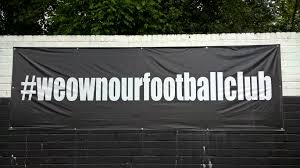By Mark Baber
January 20 – The final report from the UK Expert Working Group on Football Supporter Ownership and Engagement was published yesterday, setting out recommendations for what more can be done to encourage greater engagement between supporters and those that run their club, while also helping to remove barriers to supporter ownership, when such opportunities arise for credible supporters’ trusts to bid to own their club.
The long-awaited report has been, in the words of the authors, “prepared by football, with the authorities that run the game, working together with supporter organisations that speak on behalf of fans up and down the land.” The organisations involved in drafting it include Supporters Direct, the Football Supporters Federation, The Football Association, The Premier League, The Football League and DCMS with Portsmouth Supporters Trust, Swansea Supporters Trust, Wrexham Supporters Trust and AFC Wimbledon Supporters Trust acting as expert witnesses.
The report is far from revolutionary, and will not lead to widespread changes in the ownership of clubs but is focused on reducing barriers to fan ownership in order to “give supporters a fairer, more realistic chance of achieving a level of ownership of and thus involvement in their football clubs.”
The ownership recommendations focus on the insolvency process, which is the area in which historically the most opportunities for supporter ownership have arisen, a revised tax structure for supporter owned clubs, and the provision of funding and expertise to supporters during a bidding process.
Regarding insolvency the report authors say the Premier League and Fans Fund Panel have agreed to ensure that the terms of reference of the Fund permit Supporters Trusts of clubs in the National League, Football League and Premier League to apply for assistance with urgent and timely professional fees from an approved list of experts to assist fans in developing their plans when a club faces a crisis.
Administrators should be required to meet with Supporters Trusts and an ‘opportunity to bid’ for supporters be enforced when the club seeks to emerge from administration. Supporters Direct, supported by Football Supporters Federation will create a database of suitable professional experts who would be willing to provide pro-bono specialist advice to supporters’ bids. The Premier League has also committed to ensuring adequate funding for recognised football supporter organisations that provide a voice for supporters on ownership issues, and a further £1 million will be available to the Fans Fund in addition to the existing level of funding for those groups.
Supporter Groups should also “agree a process for formally accrediting supporter representative bodies for the purpose of involvement in football club ownership. This will further ensure that the Supporter Trusts have the necessary expertise and support to develop credible bids for collective share ownership.”
The report also looks to try and find ways around the Football Creditors Rule in insolvencies if this is acting as an insurmountable barrier to a supporters ownership bid.
Other measures which have been agreed include that the Owners and Directors Test being harmonised across competitions by the football authorities, and the football authorities commit to working together to ensure the continued harmonisation of the ODT.
Regarding tax status, the report recommends “that the government undertakes a comprehensive review of Social Investment Tax Relief (SITR) or other suitable alternatives, to give accredited Supporters Trusts a tax-efficient way of accruing funds to prepare for a future bid.”
The authors recommend a “Community Owned Sports Club model (COSC), as proposed by Supporters Direct, should be accepted by HMRC as a legitimate operating model for supporter owned football clubs.”
The Group has also “developed a model for a minimum level of structured engagement and dialogue between clubs and fans” to ensure “that clubs give supporters regular opportunities to discuss the issues which matter to supporters with relevant senior club personnel.”
The Leagues will be recommending to their clubs that there should be a meeting with a representative group of supporters at least twice a year to discuss major issues which should include the club’s Supporters Trust. Whilst the supporter representatives should be chosen democratically, the clubs should be represented by either club owners / directors and/or senior executive management at these meetings.
Rather than mandating supporter directors, the report recommends a “structured dialogue” approach as “a more inclusive way of ensuring supporters have access to strategic information, can discuss key issues with club owners, directors and senior executives and hold them accountable.”
The report recommends the FA “considers how to best engage with representative supporter groups within its decision making structures,” noting that “there is only one supporter representative on the 123 person FA Council.”
The report authors also say they recognize “the importance of the name of the club, location of the ground, club colours and the club crest to supporters,” and recommends “any substantial changes to club colours or crest are discussed as part of the structured dialogue.”
Whilst many supporters may feel the proposals and action taken to date are inadequate and will make little difference, Supporters Direct have welcomed the report saying “Ultimately the success of this report will be measured by the number of supporters who feel empowered to either take ownership or secure a greater say in the governance of their beloved club.”
Contact the writer of this story at moc.l1745245975labto1745245975ofdlr1745245975owedi1745245975sni@r1745245975ebab.1745245975kram1745245975

